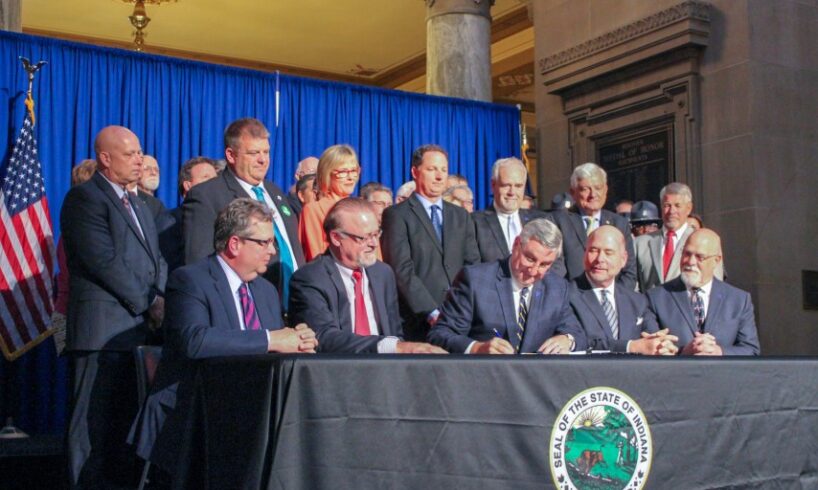
Indiana Gov. Eric Holcomb has ended the statewide public health emergency almost two years after it began March 6, 2020.
Holcomb also has signed a bill that gives state agencies additional powers and guarantees some employees in the state exemptions from employer COVID-19 vaccination mandates.
In an executive order signed Thursday, Holcomb referred to COVID-19 having spread to every county in the state and the official count of more than 22,000 Hoosiers who died from the disease or with the disease as a contributing cause of death.
The order cited the state’s implementation of a vaccination program that has resulted in 3.5 million people in the state being vaccinated; more than 56% of all those eligible.
It also cited the “rapid decline” in confirmed daily cases, hospitalizations and deaths and said with the enactment of House Enrolled Act 1001, which allows the state to continue to receive additional federal money, “this disaster has been dealt with to the extent that emergency conditions no longer exist.”
House Enrolled Act 1001 started as the bill the Indiana House drafted to make the three changes in state law that Holcomb said were necessary to end the pandemic and require employers who are mandating a COVID-19 vaccination for their employees to offer various exemptions.
House Majority Leader Rep. Matt Lehman, R-Berne, took the lead as the author of the bill, with almost the entire Republican caucus signing on as co-authors.
The House bill required employers who choose to mandate the vaccine to offer four kinds of exemptions – medical, religious, natural immunity and testing – in lieu of getting vaccinated. It would have allowed employers to test employees who had not been vaccinated once a week and said the testing would be at no cost to the employee.
The bill also included protections for employees seeking religious exemptions, saying an employer “must allow” religious exemptions and when employees state a “sincerely held religious belief” in writing, the exemption must be granted “without further inquiry.”
That language was removed in the Senate and is not in the final version.
The Senate also changed the testing requirements, allowing employers to require nonvaccinated employees to be tested up to twice a week; removed the language that said testing must be “at no cost to the employee;” and exempted nursing homes and hospitals, sports organizations and entertainment venues, including theaters and concert halls. The Senate changes are reflected in the final version of the bill as it was signed by the governor.
Holcomb’s executive order ending the emergency answered the question of what part the Indiana General Assembly would play in ending it and whether it would use its power under the state Emergency Management and Disaster Law to force the governor to end the emergency.
Lawmakers closed out the 2021 session of the Indiana General Assembly without taking action, and before the start of the current session, when the governor laid out his three requirements for allowing the emergency to expire, legislative leaders signaled their assent by writing them into the bill.
The three changes will allow the state to issue a waiver so Indiana can claim enhanced federal matching funds related to the pandemic for Medicaid and the SNAP program and will allow the state health commissioner to enable children age 5 and older to be vaccinated outside of a doctor’s office.
Enhanced SNAP benefits will expire April 16.
This article was originally posted on Holcomb ends statewide health emergency; signs vaccination exemption bill